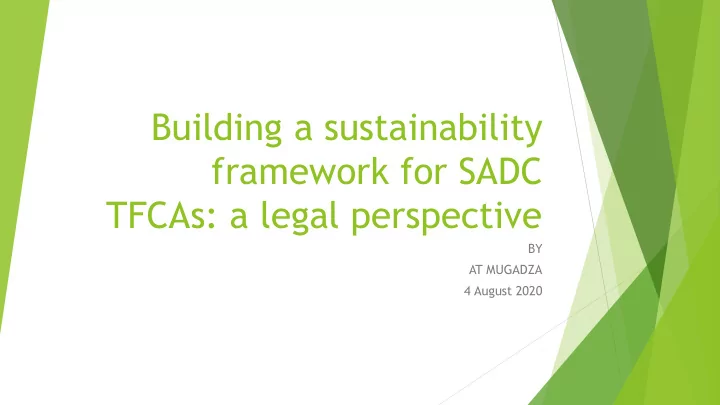

Building a sustainability framework for SADC TFCAs: a legal perspective BY AT MUGADZA 4 August 2020
SADC TFCAs Definition of TFCAs as areas or components of large ecological regions that straddle the boundaries of two or more countries, encompassing one or more protected areas, as well as multiple resource use areas. Wildife Protocol, 1999
TFCA objectives biodiversity conservation improvement of livelihoods - poverty alleviation economic development Regional integration etc
Challenges in TFCAs: GLTFCA Biodiversity conservation - fortress conservation. Improvement of livelihoods/poverty alleviation - Marginalisation of rural communities, poverty, involuntary displacement and resettlement, lack of protection of informal border trade, HWC, Human-Wildlife- Livestock Health…. Economic development (Tourism challenges) – lack of revenue sharing, uneven distribution of tourism development, reduced of local control, economic instability … Governance structure weaknesses – exclusion of local communities as key actors, weak property rights, lack of devolution of power to rural communities, political instability in TFCA country components ….
Striving for sustainability Pillars of sustainable Legal principles for sustainable development development Sustainable use of natural & cultural resources – protected Economic sustainability areas management, biodiversity conservation, sustainable tourism, hunting, CBNRM, TBNRM, agriculture, livestock, fishing, Ecological sustainability cultural/heritage fairs, etc. Equity and poverty eradication - social equity , human rights, Social & cultural community wellbeing, displacement & resettlement, local prosperity, employment quality,. sustainability Common but differentiated responsibilities and Political & institutional capabilities- different groups before the law require different rights and responsibilities sustainability Good governance – legitimacy, devolution/local control, inclusivity, transparency, accountability, fairness, adaptability Integration – economic, social and environmental policies/programs; reconciling, accommodating and harmonising the priorities, concerns and norms etc Procedural principles – public participation, access to information and justice
Striving for sustainability – legal approach Rationale Focus: legal framework The essence of a legal approach is Governance actors – to address to ensure that these aims or policy the governance challenges implications translate into rules, Governance tools – to determine norms and prescriptions that are the tools that these actors use to explicitly formulated, address the challenges to realize authoritative, legitimate and TFCA objectives enforceable.
Striving for sustainability: environmental governance approach TFCA Governance actors Relevant Laws State actors – state parties, line Law establishing TFCAs ministries (national, provincial, Protected areas management laws local), protected areas managers. Local governance laws Non state actors – private Tourism laws landowners, businesses, local communities, NGOs, civil society, Laws governing other economic external entities (donors). activities Other governance laws
Striving for sustainability: environmental governance tools TFCA Governance actors Relevant Legislation State actors – state parties, line Law establishing TFCAs ministries (national, provincial, Protected areas management laws local), protected areas managers. Local governance laws Non state actors – private Tourism laws landowners, businesses, local communities, NGOs, civil society, Laws governing other economic external entities (donors). activities
Striving for sustainability: environmental governance tools TFCA challenges Governance tools Biodiversity conservation Command & control Improvement of Incentive based tools livelihoods/poverty alleviation Agreement based tools Economic development (tourism) Civil based tools
Striving for sustainability: environmental governance tools Mandatory management options for local communities to participate in protected areas management; Mandatory CBNRM mechanisms, including benefit-sharing mechanisms; Administrative sanctions for non-compliance with the above tools; Criminal sanctions for wildlife crimes – poaching, illegal fires, illegal trade, etc; Biodiversity CBNRM incentives for local communities; conservation Agreements between state actors, private actors and local communities for biodiversity conservation; Enforcement of rights to natural resources, including land; Complementary procedural rights for the enforcement of the natural resource rights; and Civil remedies for infringement of natural resource rights.
Striving for sustainability: environmental governance tools Mandatory provisions for poverty reduction programmes or strategies; provision of basic services by private actors; voluntary TDIDR Provincial legislation and local government by-laws for basic services by provincial and local government, Improvement of Social licenses, prescribed in law, for improvement of livelihoods through tourism development projects; livelihoods/ HRIAs, provided for in law, for tourism development projects alleviation of Voluntary or agreement-based tourism certification standards for poverty improvement of livelihoods and poverty alleviation private sector facilitating TDIDR; Incentives /agreements for private actors to provide basic services; Facilitate voluntary TDIDR Agreements between state actors, private actors and communities affected by TDIDR Rights of : access to basic services; local communities affected by TDIDR; Civil Remedies for violation of these human rights.
Striving for sustainability: environmental governance tools International revenue sharing agreement(s) for TFCA participating countries; Mandatory provisions for : national revenue sharing mechanisms to effect international agreement(s); tourism planning and strategy, marketing, infrastructure development, land use planning in TFCAs; for investment in TFCAs; Tourism concessions; Equitable treatment of foreign and national investors, large investors and SMEs; Local procurement by private actors in TFCAs; Movement of goods and persons in TFCAs; Economic Labour regulations for tourism employers in TFCAs; dvt in TFCAs CSR provisions for private actors; and Incentives for: Investment in TFCAs; Incentives for tourism businesses, including, land rights for tourism investors; Favourable immigration controls for foreign tourism businesses and tourists; Local procurement by state actors and private actors; Improved employment quality by the tourism sector in TFCAs; Job creation and job security by the tourism sector in TFCAs; Tourism specific incentives and certification standards for additional CSR strategies. Agreements for Investment in TFCAs (PPPs) Movement of goods and persons in TFCAs; Local procurement by state actors and private actors
Questions?
Thank you Email: mugadzaat@staff.msu.ac.zw
Recommend
More recommend